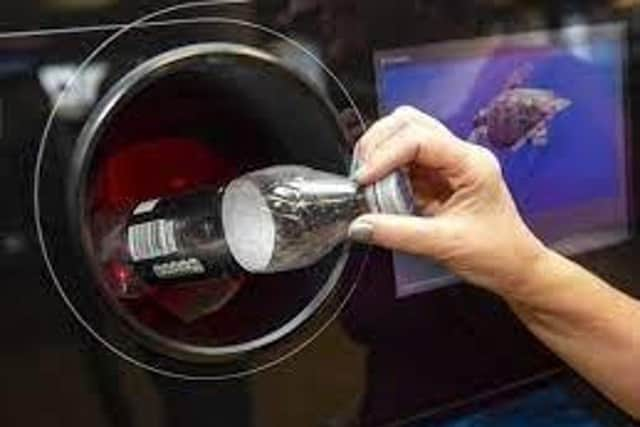Deposit return scheme Scotland: Businesses call for compensation after delay to Scotland's DRS
The Federation of Independent Retailers said those shop owners who had already entered into “expensive” contracts to install reverse vending machines and invested time and money to reconfigure their stores should receive payments.
The call came less than 24 hours after First Minister Humza Yousaf announced the scheme’s launch was being pushed back to next March.
Advertisement
Hide AdAdvertisement
Hide AdIt comes as some small producers urged Mr Yousaf to replace Lorna Slater as circular economy minister. The Scottish Greens co-leader has been widely criticised by industry for her handling of the DRS.
The scheme, which is aimed at increasing the recycling rate of single-use drinks bottles and cans, was due to be rolled out in August. But in recent months, it has faced fierce opposition from many small breweries, distillers, and retailers.
Mr Yousaf said that delay would provide ten months for “businesses to get ready,” adding the Government would use the additional time to work with firms and the scheme’s administrator, Circularity Scotland, to “address concerns” and ensure a “successful launch” next year.
He said a package of measures will also be put in place to “simplify and de-risk” the DRS. Further details of the measures, along with a new timetable for the scheme, are expected to be announced by Ms Slater at Holyrood on Thursday.
It is understood the planned statement will outline the Government's plans to ease the burden of the scheme on small businesses. It will also indicate some of the displeasure from the Government about the failure of its UK counterpart to agree to an internal market act exemption.


Sources said business confidence in the DRS effectively collapsed following the briefing from the UK Government in late February saying it planned to block the scheme. This intervention led to businesses telling Circularity Scotland they were not willing to sign up to the scheme due to it being “illegal”, fatally undermining the scheme's deliverability.
They said a decision on whether the scheme would receive an exemption was needed within a month to ensure business confidence.
Mo Razzaq, deputy vice-president of the Federation of Independent Retailers, said the body had supported the DRS from the outset, but had concerns over a lack of information on how it will work, and fears over increased costs to those smaller retailers acting as return points.
Advertisement
Hide AdAdvertisement
Hide AdWhile welcoming the decision to postpone the scheme’s launch, he called for retailers who had already signed contracts for reverse vending machines to be compensated for the delay.


Mr Razzaq, from Glasgow, said: “It makes sense to delay the launch because communication from the Scottish Government has been poor and it will help retailers due to all the mixed messages we have been getting.
“We still have a lot of unanswered questions and we will be demanding compensation for those retailers that have already entered into expensive contracts for the reverse vending machines required to operate the scheme. Many of our members have spent large sums of money buying reverse vending machines and altering the layout of their stores to be prepared for the launch of the scheme in August.”
He added: “We will also continue to push the Government for grants to help pay for the machines. The Irish government has said it will help smaller retailers in this way, and we urge the Scottish Government to follow Ireland’s lead.”
The calls for some form of financial redress for those firms impacted by the delay were echoed by an environmental compliance data specialist that works with companies to minimise the environmental impact of their packaging. Andrew McCaffery, chief strategy officer of Ecoveritas, questioned whether there might be temporary support or reimbursement for those firms that had prepared for August’s launch.
“You do have to feel for responsible businesses that have kept on top of this legislation, developed and changed to meet these new requirements,” he said. “Any delay penalises those that have acted quickly. You have to wonder whether there might be temporary support or reimbursement for those who have diligently prepared and significantly invested.”
It is unclear whether there will be further ramifications as a result of the DRS delay. In February, Aidan O’Neill KC, one of Scotland’s leading lawyers, told The Scotsman that firms who had invested substantial sums towards meeting their obligations under the scheme may be in a position to recoup the money from the Scottish Government if the initiative’s regulations were not granted an opt out from the UK Internal Market Act. Mr Yousaf told Holyrood on Tuesday the UK Government had delayed such a decision.
Meanwhile, the director of a Scottish craft gin producer has said the problems surrounding the DRS demonstrated the need for changes at the top. Chris Payne, who established Glasgow-based Shoogle Spirits with his wife, Leigh, in 2018, said while he was pleased the scheme had been pushed back, the delay was “insufficient” for addressing multiple concerns raised by producers, retailers and hospitality providers.
Advertisement
Hide AdAdvertisement
Hide AdHe said he blamed Ms Slater for the “deliberate obfuscation around the real issues that have plagued the DRS from the outset”, adding: “We therefore urge the First Minister to consider a change in leadership of the scheme to help re-establish trust with businesses and to assure the collective co-operation and commitment needed to realise the environmental benefits that a workable DRS will deliver.”
Other larger producers also said there was a need for widespread changes to be made to the DRS during the delay period. Dougal Sharp, founder of the Innis & Gun brewing company in Edinburgh, said while his firm supported the need for increased recycling, the scheme “needs ripped up and started again properly.”
He explained: “I am very clear that the scheme, whether it’s now or next March, is a nonsense, because I don’t think it will achieve the ambitions of the levels of recycling it is aiming for. It will simply push more costs on to the consumer.
"If you’re a low-income family that’s just getting by, you’ll be facing an extra £30 or £40 a week on your bill. The ideology behind it is a nonsense, all that will happen is that consumers pay more.”
Comments
Want to join the conversation? Please or to comment on this article.